President Choi’s Blog
Alumni celebrate a Mizzou scuba legacy
June 6, 2023
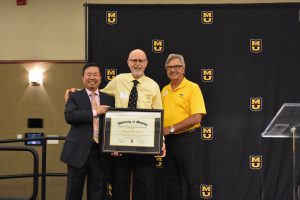
At Mizzou, students can achieve their goals while discovering new, lifelong interests. Last weekend, I saw the lasting impact of these experiences when more than 200 alumni honored the instructor of an unforgettable course: scuba diving.
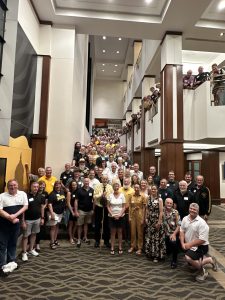
Known to many as Coach, Bill Busch taught Scuba Theory at Mizzou from 1964 to 2020 and helped grow an adventurous diving community in the middle of Missouri. He also led opportunities for students to prove their new skills in destinations like the Cayman Islands.
The on-campus reunion was hosted by Bill’s former students, including University of Missouri Curator Keith Holloway. Alums celebrated their mutual interest in scuba and appreciation for the course. Bill was also surprised with the Outstanding Service Award from the National Association of Underwater Instructors and an MU certificate recognizing his legacy.
I want to thank Bill for introducing a love of scuba diving to generations of students.
— Mun
Tigers in Bergamo!
May 30, 2023
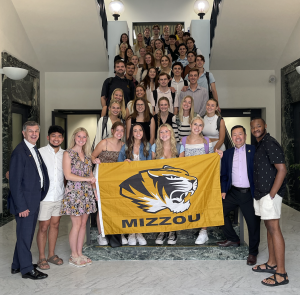
I had a chance to visit Mizzou students enrolled in the Trulaske College of Business Study Abroad program at the University of Bergamo (Italy). This program was started more than 20 years ago by MU Professor Charles Franz and Professor Mauro Cavallone of Bergamo.
This year, nearly 40 MU students are integrated in intensive coursework alongside Italian and other European students. They are taught by both MU and Bergamo faculty in a variety of courses in finance and international business. Students also participate in team projects and case analyses that encourage cross-cultural interactions and the development of a global approach to business.
In addition to the coursework, students enjoy touring the beautiful Lombardy region of Italy as well taking weekend trips to Milan, Rome, Paris and Prague. Students will return to Mizzou with a deep appreciation of Italian culture, language and cuisine and for the opportunity to learn in a unique environment.
I appreciate our MU faculty – including Assistant Teaching Professor and Trulaske Study Abroad Director Shannon Breske – and Bergamo colleagues for making this experience possible for our students.
— Mun
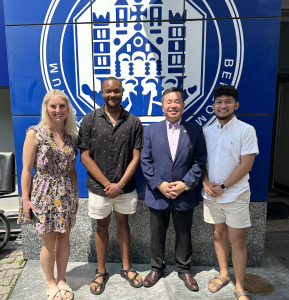
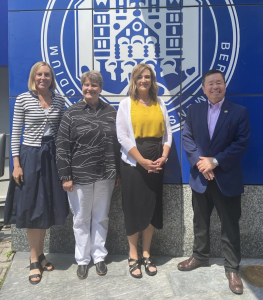
Enhancing accessibility in Greektown
May 24, 2023
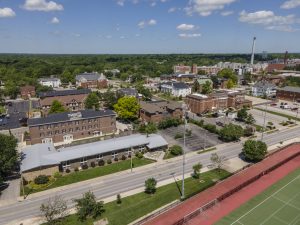
Thanks to the leadership of our sorority community, new sidewalk improvements are planned for Greektown, an area adjacent to campus that is home to many students.
Members of the Panhellenic Association’s (PHA) Accessibility Committee initially discussed repairing and extending sidewalks with the Columbia City Council. Last summer, the Columbia Public Works Department presented preliminary designs for the project.
Given its importance to Mizzou, the university and the City of Columbia have agreed to share total costs. PHA will also contribute $17,000. Pending final approval by the Columbia City Council, work will be completed next summer along Rollins Street, Burnam Avenue, Kentucky Boulevard, Curtis Avenue, Richmond Avenue and Tiger Avenue.
Sorority and fraternity organizations are a significant part of student life. We’re proud to help create a more accessible community.
— Mun
Showing our appreciation
May 18, 2023
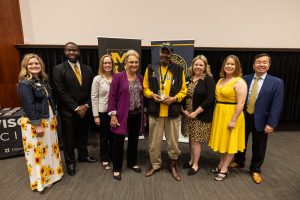
We’re kicking off summer with Staff Recognition Week, a series of events celebrating the importance of staff members to the university’s teaching, research and outreach mission. Throughout the week, there were many opportunities for employees to have fun and connect with others from across campus, including a free lunch in the Student Center that had more than 1,300 attendees.
On Wednesday, I was at the annual Staff Recognition Awards to help honor those with notable service anniversaries — including five who have worked at Mizzou 40 years or more — and other achievements. I also introduced winners of the Chancellor’s Outstanding Staff Awards. Recipients were nominated for awards by their MU and UM System colleagues.
I am grateful to all staff members for making a difference in our community and across Missouri. I also want to thank the Staff Advisory Council for organizing this week’s events.
— Mun
Celebrating our graduates and honorary degree recipients
May 16, 2023
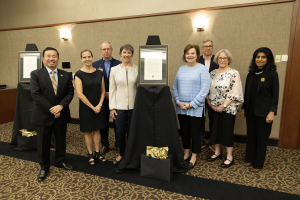
Congratulations to the more than 6,000 Mizzou students who graduated last weekend. Among the commencement ceremonies, we also recognized two distinguished alumni who were conferred honorary doctorate degrees: Dr. Kristy Weber and Ed Rapp.
• Dr. Kristy Weber – After graduating from Mizzou in 1987 with a degree in animal sciences, she attended medical school at Johns Hopkins University and was a fellow at the Mayo Clinic. Her research into sarcoma, a rare cancer that accounts for around 1% of new cancer diagnoses, has profoundly impacted the field. Dr. Weber was the first woman elected president of the American Academy of Orthopaedic Surgeons and is a professor and director of the Sarcoma Program at Penn Medicine’s Abramson Cancer Center.
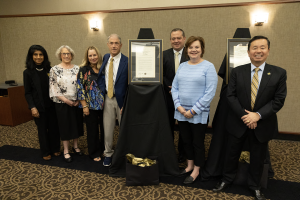
• Ed Rapp – He was a first-generation MU student from Pilot Grove, Mo. and graduated in 1979 with a degree in business administration with an emphasis in finance. He went on to become group president and CFO of Caterpillar, Inc., a $60 billion company. After being diagnosed with ALS in 2015, Mr. Rapp founded Stay Strong vs. ALS to improve the lives of those impacted by the disease and to help find a cure. He is a longtime supporter of rural students through our Heartland Scholars Academy.
An honorary degree is the highest form of recognition offered by the university to individuals of exceptional distinction. For new Mizzou grads, Dr. Weber and Mr. Rapp offer great examples of alumni achievement and leadership.
— Mun
Exemplary service with ROTC
May 12, 2023
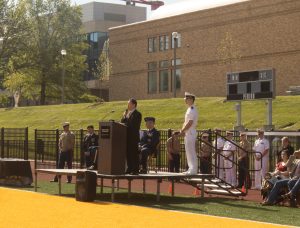
Last week, I was honored to attend the ROTC Joint Services Pass in Review. This tradition highlights the excellence of cadets and midshipmen in our Army, Air Force and Naval ROTC programs. Service members and veterans from across the state were also present, including from the St. Louis Navy League, the Marine Corps League, Air Force and several honorees from the MU Army ROTC Hall of Fame.
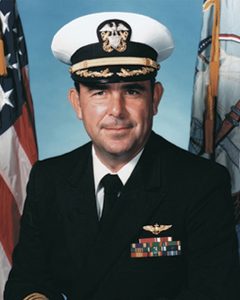
Many ROTC cadets and midshipmen go on to positions of leadership, such as Navy Capt. Jack Punches. He was a 1973 Mizzou civil engineering graduate who was commissioned from MU’s Navy ROTC program. After a highly decorated career, Capt. Punches retired in 2000 before returning several months later as a senior civilian employee. He was killed in the Sept. 11 attack on the Pentagon.
This year marks the 50th anniversary of Capt. Punches’ graduation from Mizzou. I was proud to honor him previously during our Patriot Day Memorial and again at Pass in Review. A tribute to Capt. Punches is located on the first floor of Crowder Hall.
ROTC prepares cadets and midshipmen for incredible lives of service. It was a privilege to celebrate their skill and accomplishments.
— Mun
Applauding alumni excellence at the Golden Quill Awards
May 9, 2023
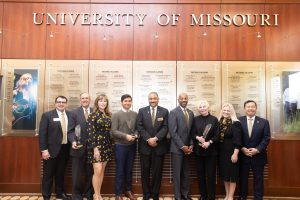
We recently honored four influential Tigers with the Jefferson Club Golden Quill Alumni Excellence Award. Recipients are nominated by the Mizzou community and selected by the Jefferson Club Board of Trustees for their outstanding achievements and commitment to the university’s values.
This year’s winners are:
• Robert K. Dixon – senior advisor to the U.S. Secretary of Energy and co-founder and lead author of the United Nations Intergovernmental Panel on Climate Change, which received the 2007 Nobel Peace Prize
• Natasha Kaiser-Brown – world-class runner and associate head coach for the Mizzou track and field team
• Jonathan B. Murray – television and documentary producer and co-founder of reality television company Bunim/Murray Productions
• David C. Novak – co-founder and CEO of David Novak Leadership and co-founder and former chairman and CEO of Yum! Brands, Inc.
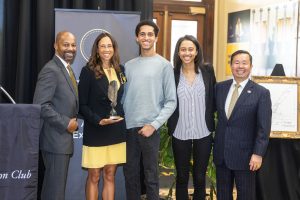
Along with an award, their names are now displayed on the Notable Alumni Wall in Jesse Hall alongside a host of MizzouMade Tigers, including Emmy Award-winning journalist Jim Lehrer, Rock and Roll Hall of Fame member Sheryl Crow, former Jamba Juice and Ocean Spray CEO James White, Panda Restaurant Group co-founders Peggy and Andrew Cherng, and so many others.
Each recipient sets high standards for us and provides a proven example of excellence to the next generation. They show the power of a Mizzou education to inspire change and discover new possibilities. Congratulations to all the winners.
— Mun
Honoring our incredible faculty
May 4, 2023
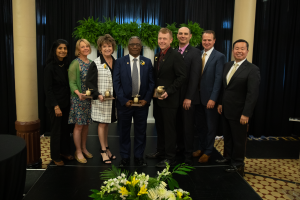
Yesterday we celebrated the 2023 William T. Kemper Fellowships for Teaching Excellence, the highest teaching award given on our campus. Each year, Mizzou and Commerce Bank team up to honor MU faculty members who have a deep commitment to student success. This is the 33rd class of fellows since the awards were established in 1991 by the William T. Kemper Foundation.
During the ceremony, the five new fellows were celebrated by their families, school and college colleagues and past Kemper recipients. Before they received their golden apple award, each was introduced by a former student who shared the direct impact that faculty member had on them.
The Kemper Awards Ceremony marked the conclusion of our annual Faculty Excellence Week. This year, the celebration grew to include seven events recognizing a variety of faculty accomplishments, including book publications, prestigious awards and, of course, teaching excellence.
Each faculty member makes valuable contributions to our state and world. It was great coming together to celebrate all they do.
— Mun
The outsized impact of CEHD
May 2, 2023
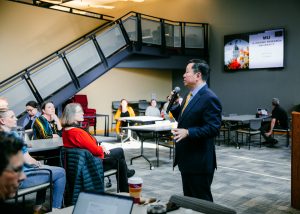
Throughout the academic year, I visited with each of our 13 schools and colleges. On my final stop, I met with faculty and staff from the College of Education & Human Development (CEHD) to recognize their many accomplishments.
CEHD is home to more than 1,000 undergraduates, including future teachers who complete hands-on training in classrooms across the state. The college’s commitment to student success is paying off. Their graduation rate is an impressive 81%, and 99.5% of CEHD students have a positive career outcome within six months of finishing their degree.
CEHD also has an outsized contribution to our research. Their faculty received $107 million in research awards from 2019 to 2022. This translates to innovative programs that make a difference in our state. The National Science Foundation supported two recent CEHD projects to provide STEM research opportunities to students with disabilities and to implement a green energy curriculum in rural Missouri schools. Three world-class MizzouForward researchers have also joined CEHD, expanding the college’s impact even further.
Faculty want to join the college because of its excellent reputation. Our students know that CEHD prepares them to lead and launch careers in high-demand fields that make a difference.
— Mun
Inspiring young leaders with Missouri FFA
April 27, 2023
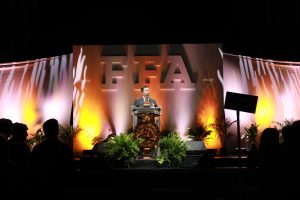
Last week, we hosted around 9,000 Missouri FFA members, parents and guests for their annual convention. The inaugural convention was held on Mizzou’s campus in 1929. What started with a few hundred members in Waters Hall now fills the Hearnes Center and brings in participants from around the state.
FFA members are current high school students studying agriculture and natural resources. They also engage in leadership development throughout the year. During the convention, members had the chance to expand on these skills through Career Development Events facilitated by CAFNR faculty. Since FFA members have a range of career interests, we also offered tours of our Sinclair School of Nursing, College of Engineering and College of Veterinary Medicine.
Both Missouri FFA and Mizzou share a mission to serve and educate the next generation of state leaders. We enjoyed hosting the convention and building on our historic partnership.
— Mun